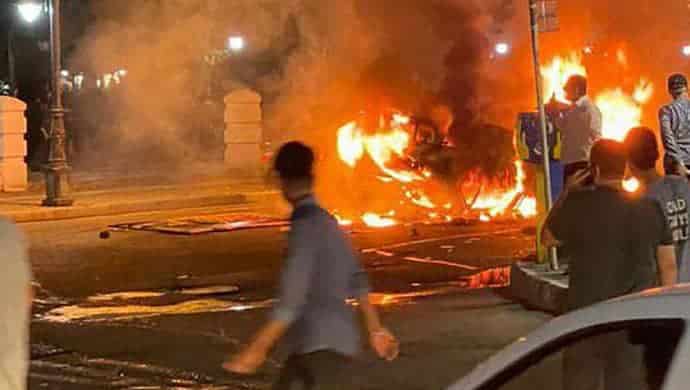Support Iran’s Uprising and End the Silence that Reinforces the Regime’s Impunity

Written by
Mehdi Oghbai
Now that the Iranian people’s national uprising has been going on for nearly two whole months, it is long past time for the international community to recognize the real possibility of regime change and to begin acting accordingly. Western leaders have offered verbal encouragement to the protesters. But those statements have generally fallen short of appropriately endorsing the people’s movement for regime change or acknowledging their rights of self-defense in the face of escalating state repression.
Of course, Western powers and international bodies have denounced that repression, but they have yet to enact a strategy that actually aims to stop it or to hold its perpetrators accountable. Yet there is much they can do for the sake of those goals, and most of these actions would also help the Iranian people to achieve their own aims without rising to the level of direct foreign intervention in Iranian affairs.
Iran protests round-up—Day 59 | November 13, 2022
Iranian authorities have killed approximately 550 protesters so far, while 30,000 have been arrested. Around 1,000 indictments have been announced just in Tehran over the past two weeks, some of them being for political charges like “enmity against God,” which carry the death penalty. The people have valiantly resisted all attempts at repression, often confronting heavily armed security forces while wielding only rocks. But in the absence of serious pressure from the outside world, that resistance can only do so much.
Crackdowns will inevitably continue either until the regime collapses once and for all or until the mullahs are made to believe that they put themselves at greater risk by carrying on than by holding back. They’re not likely to draw that conclusion anytime soon, but if they ever do so, it will be because they are facing dual pressures from the domestic population and the outside world.
The Iranian people have been doing their part to create that situation ever since the death of Mahsa Amini at the hands of Tehran’s “morality police.” At every turn, they have made it clear that nothing will force them back into compliance with the status quo. Security forces remain preoccupied with demonstrations in upwards of 200 cities which repeat calls for “death to the dictator” and declare that the regime will fall in “this bloody year.”
contradicting statements from Iranian state officials
Furthermore, in contrast to prior uprisings, the current movement for regime change has been re-invigorated by every subsequent death at the hands of suppressive forces. Shiite tradition dictates that memorials are held 40 days after a person’s death, and these ceremonies have become the spark for numerous gatherings of thousands upon thousands of protesters who have committed to not only mourning their fallen colleagues but also guaranteeing that their deaths will not be in vain.
The sheer size and frequency of these gatherings clearly pose a challenge to the regime’s longstanding strategy for halting public unrest. Thus, the uprising continued into its third month even after the head of the Islamic Revolutionary Guard Corps declared an end to “riots” and threatened anyone who continued going to the streets. Similar threats have been made by none other than Supreme Leader Ali Khamenei, yet protesters continue to condemn him by name and insist that his reign is at an end.
Unfortunately, the international community’s relative silence over that prior crackdown makes it all but certain that the current death toll will continue to escalate. That silence has reinforced the preexisting notion that Tehran enjoys impunity in matters of human rights and will still be treated as a legitimate player on the world stage no matter how severe its abuses become.
There are straightforward steps that world powers can take toward removing that sense of impunity if they want to do their part to convince Tehran that it cannot hope to maintain its grip on power while still cracking down on dissent. Iranian embassies should be summarily shuttered, and all outstanding negotiations with the regime should come to an end. World leaders should also consider opening dialogue with the force behind the ongoing unrest, namely the National Council of Resistance of Iran (NCRI), which constitutes a viable, democratic alternative to the theocratic system.
The international community can also bolster that organization’s efforts and help increase the domestic pressure on the clerical regime simply by affirming the rights of the Iranian people to defend themselves against tyranny and repression actively. This is a step that the Western world should have taken a long time ago, just as it should have pursued accountability for those who carried out the November 2019 crackdown. But even three years after that crackdown, it is not too late to definitively take a side in the struggle between the Iranian regime and the people, especially since Iranians are clearly committed to that struggle for the foreseeable future.

